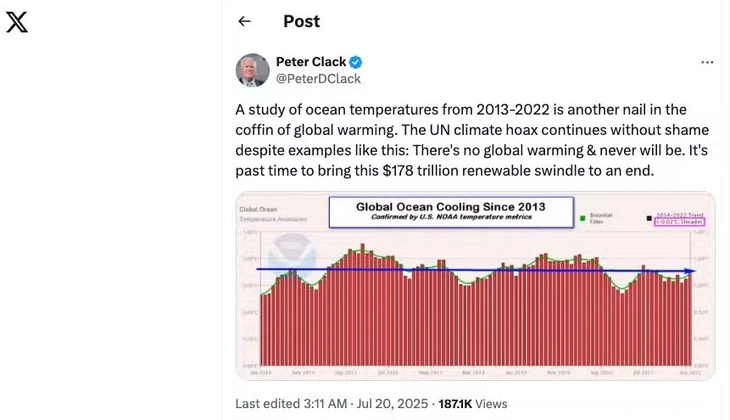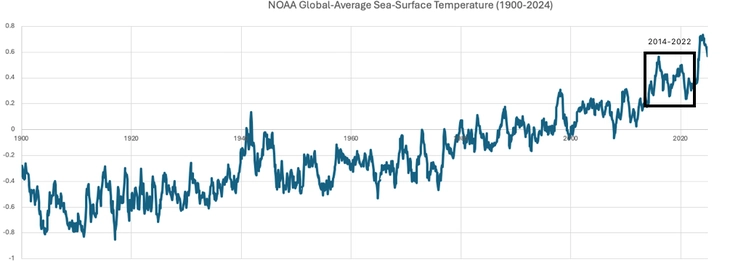
The post with the ocean temperature chart from 2013 - 2022 caused many misunderstandings - Photo: SCIENCE FEEDBACK
On July 20, the account "Peter Clack" posted a chart that was said to be about ocean surface temperature in the period 2013 - 2022 on X with the statement "global ocean temperature is cooling, proving there is no global warming phenomenon".
The post even claimed that “there is no such thing as global warming and there never will be,” a claim that is completely contrary to the scientific evidence available to date, but has attracted more than 186,000 views in less than a week.
Science Feedback reached out to climate scientists to verify the information in the viral post and learn more about recent ocean temperature trends.
The ocean is not "cooling down"
After verification, Science Feedback on August 6 confirmed that the chart in the viral post is incorrect and the ocean is not "cooling" or "cooling down".
According to experts, the viral post uses a selective chart for a short period, typically from 2014 - 2022, in which short-term natural phenomena such as El Nino and La Nina affect short-term ocean surface temperature trends, to create the misconception that the ocean is not warming or is cooling.
Such short-term fluctuations do not reflect the full picture of climate. Climate change occurs on long-term scales, spanning decades or more. When we plot data on a long-term scale, we see a clear trend of accelerating global warming.
Scientists have completely disproved the above claim by relying on long-term data on ocean surface temperature and ocean heat content (OHC), that is, the amount of heat stored in the ocean.

A graph of global average ocean surface temperature from 1900 - 2024 shows the long-term warming trend of the Earth's oceans - Photo: NOAA
The ocean is getting warmer
Long-term data show that the ocean is warming at an increasing and sustained rate, clearly reflecting the impact of human-caused climate change.
Notably, in the period after 2014-2022, global ocean temperatures spiked in 2023, increasing by about 0.7°C (compared to the 1991-2020 average), partly due to a prolonged El Nino event combined with a long-term warming trend.
The oceans are very efficient at storing heat, helping to stabilize the Earth's climate. But as long as the oceans continue to retain this heat, our climate system will suffer.
Specifically, oceans absorb more than 90% of excess heat caused by greenhouse gases, making them an important buffer in the Earth's climate system.
Some of the consequences of ocean warming are well documented, including contributing to sea level rise, increasing the frequency and intensity of marine heat waves that affect marine ecosystems and fisheries, and more intense storms.
Source: https://tuoitre.vn/dai-duong-khong-he-ha-nhiet-ma-dang-am-len-nhanh-chong-20250808130817477.htm











































































































Comment (0)